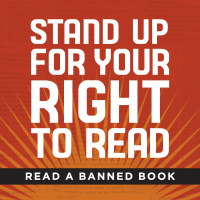 Have you ever read a banned book? If you read, you have. The list of books that have been challenged somewhere in the United States is astounding. It includes many classics. I knew that “The Catcher in the Rye” was challenged back in the 1960s. But I had no idea that it and many others I would not consider controversial continue to be the target of misguided censorship. Even the Bible appears on the American Library Association’s list of the 10 most frequently banned books of 2015.
Have you ever read a banned book? If you read, you have. The list of books that have been challenged somewhere in the United States is astounding. It includes many classics. I knew that “The Catcher in the Rye” was challenged back in the 1960s. But I had no idea that it and many others I would not consider controversial continue to be the target of misguided censorship. Even the Bible appears on the American Library Association’s list of the 10 most frequently banned books of 2015.
This week (Sept. 25 to Oct. 1) is Banned Books Week. It began in 1982 in response to a surge in attempts to ban books in schools, bookstores and libraries. That year, representatives of the American Society of Journalists and Authors(ASJA) and other concerned groups held a read-in of banned books on the steps of New York Public Library. Since then, more than 11,300 books have been challenged.
This week hundreds of libraries, bookstores and concerned groups across the country are staging events to draw attention to these acts of censorship. Take a look through the Twitter feeds of literary and free speech organizations. There are some surprisingly relevant examples of censorship in history – such as this speech about refuges written by William Shakespeare. Others are having some fun with it. The Washington, D.C., public library is running a scavenger hunt, hiding banned books all over the city and posting clues about their locations on social media.

Photo courtesy of ASJA
Such events draw attention to the issue, but not enough. We live in an age of polarization, where many people talk past, rather than listen to, each other and where agenda-driven groups try to quash ideas they don’t like. In the cacophony of the 24-hour news cycle, vapid talk radio and social media that shrink our attention spans to 140 characters, it’s increasingly hard to think critically. Reading a book takes time. It’s a private activity. We get to weigh the information presented, and perhaps reconsider our viewpoint.
Our diversity and our freedom to say, publish and read what we want is the heart of our democracy. “Whoever would overthrow the liberty of a nation must begin by subduing the freeness of speech,” wrote Benjamin Franklin. In today’s context, Neil Gaiman said it well: “If you don’t stand up for the stuff you don’t like, when they come for the stuff you do like, you’ve already lost.”
Writers, readers and citizens have a responsibility to use their freedom and defend it. So read a banned book this week, and pass it on.
